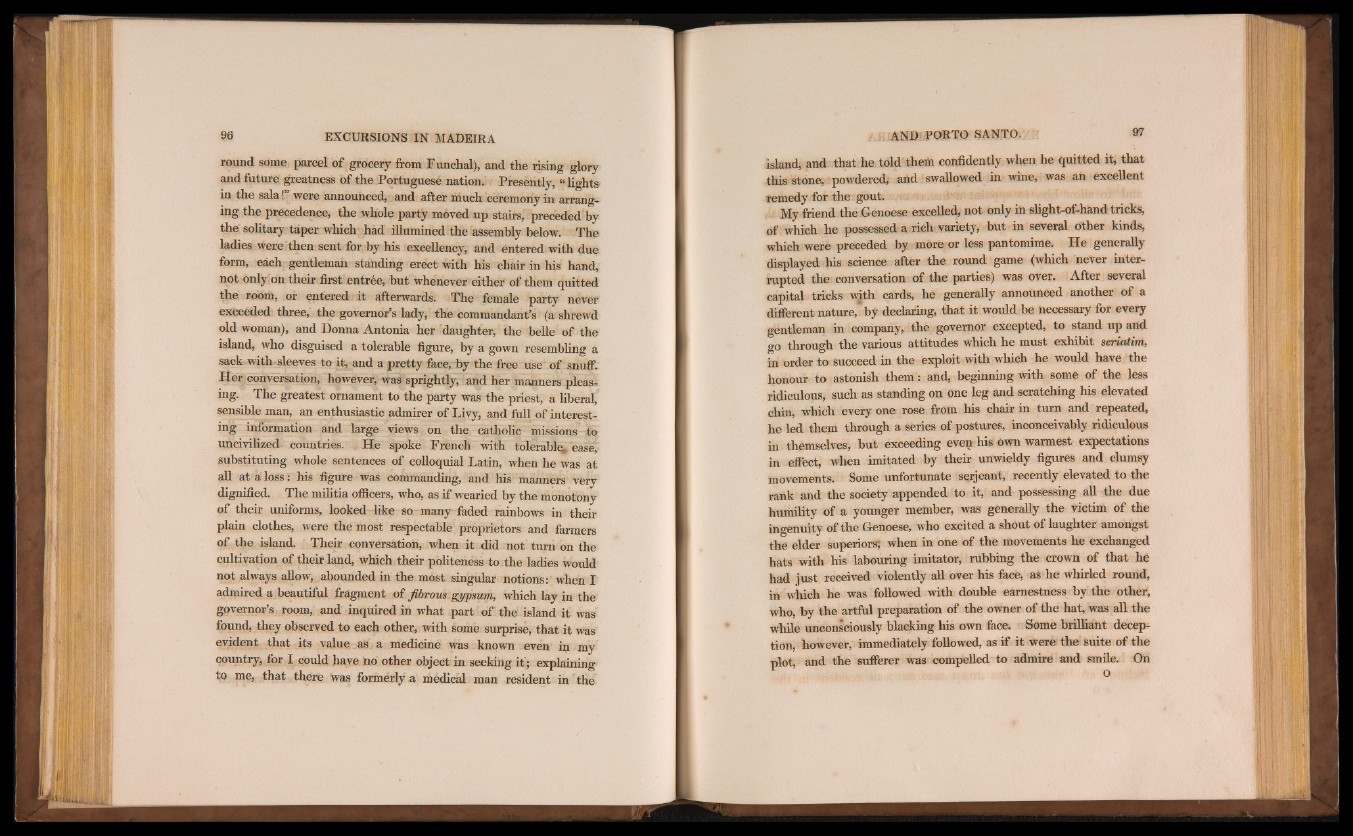
round some parcel of grocery from Funchal), and the rising glory
and future greatness of the Portuguese nation. Presently, “lights
in the sala!” were announced, and after much ceremony in arranging
the precedence, the whole party moved up stairs, preceded by
the solitary taper which hàd illumined the assembly below. The
ladies were then sent for by his excellency, and entered with due
form, each gentleman standing erect with his chair in his hand,
not only on their first entrée, but whenever either of them quitted
the room, or entered it afterwards. The female party nèver
exceeded three, the governor’s lady, the commandant’s (a shrewd
old woman), and Donna Antonia her daughter, the belle of the
island, who disguised a tolerable figure, by a gown resembling a
sack with-sleeves to it, and a pretty face, by the free use of snuff.
Her conversation, however, was sprightly, and her manners pleas-
ing. The greatest ornament to the party was the priest, a liberal,
sensible man, an enthusiastic admirer of Livy, and full of interesting
information and large views on the catholic missions to
uncivilized countries. He spoke French with tolerably ease,
substituting whole sentences of colloquial Latin, when he was at
all at a loss : his figure was commanding, and his manners very
dignified. The militia officers, who, as if wearied by the monotony
of their uniforms, looked like so many faded rainbows in their
plain clothes, were the most respectable proprietors and farmers
of the island. Their conversation, when it did not turn on the
cultivation of their land, which their politeness to the ladies would
not always allow, abounded in the most singular notions: when I
admired a beautiful fragment of fibrous gypsum, which lay in the
governor’s room, and inquired in what part of the island it was
found, they observed to each other, with some surprise, that it was
evident that its value as a medicine was known even in my
country, for I could have no other object in seeking it; explaining
to me, that there was formérly a medical man resident in the
island, and that he told them confidently when he quitted it, that
this stone, powdered, and swallowed in wine, was an excellent
remedy for the gout.
My friend the Genoese excelled, not only in slight-of-hand tricks,
of which he possessed a rich variety, but in several other kinds,
which were preceded by more or less pantomime. He generally
displayed his science after the round game (which never interrupted
the conversation of the parties) was over. After several
capital tricks with cards, he generally announced another of a
different nature, by declaring, that it would be necessary for every
gentleman in company, the governor excepted, to stand up and
go through the various attitudes which he must exhibit seriatim,
in order to succeed in the exploit with which he would have the
honour to astonish them: and, beginning with some of the less
ridiculous, such as standing on one leg and scratching his elevated
chin, which every one rose from his chair in turn and repeated,
he led them through a series of postures, inconceivably ridiculous
in themselves, but exceeding even his own warmest expectations
in effect, when imitated by their unwieldy figures and clumsy
movements. Some unfortunate serjeant, recently elevated to the
r a n k and the society appended to it, and possessing all the due
humility of a younger member, was generally the victim of the
ingenuity of the Genoese, who excited a shout of laughter amongst
the elder superiors; when in one of the movements he exchanged
hats with his labouring imitator, rubbing the crown of that he
had just received violently all over his face, as he whirled round,
in which he was followed with double earnestness by the other,
who, by the artful preparation of the owner of the hat, was all the
while unconsciously blacking his own face. Some brilliant deception,
however, immediately followed, as if it Were the suite of the
plot, and the sufferer was compelled to admire and smile. On